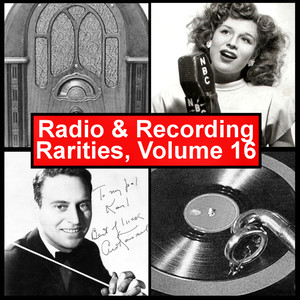
Radio & Recording Rarities, Volume 16
- 流派:Pop 流行
- 语种:英语
- 发行时间:2007-01-01
- 类型:录音室专辑
- 歌曲
- 时长
简介
LARRY CLINTON and BEA WAIN: Larry Clinton (born August 17, 1909, Brooklyn, New York) was a trumpeter who became a prominent American bandleader from 1937 to 1941 and again from 1948 to 1950, having stopped to enlist as a flight instructor during the war years. His practice of rearranging the works of composers like Debussy and Tchaikovsky and adding lyrics was known as "swinging the classics." His version of Debussy’s "Reverie", with vocalist Bea Wain, was particularly popular. Clinton also provided conventional arrangements for performers like the Dorsey brothers, Glen Gray, Louis Armstrong, and Bunny Berigan. HORACE HEIDT and GENE WALSH and QUIG QUIGLY: Horace Heidt (May 21, 1901 - December 1, 1986) was an American pianist, Big Band leader, radio and television personality, and entertainer. He is best known for his band "Horace Heidt and His Musical Knights" that toured vaudeville and performed on radio and television for a number of years. For a time, actor Art Carney was the band's singing comedian. His "Pot O' Gold" radio show became the basis for a 1941 film of the same title; the film featured Heidt as himself with his band, and starred Jimmy Stewart and Paulette Goddard. His "Original Youth Opportunity Program" on radio went directly to TV in 1950. It was one of the first talent shows on TV. Among winners of the show were Dick Contino (accordion), Ralph Sigwald (vocals) and Al Hirt (trumpet). Horace Heidt died in 1986. For his contribution to radio and television, Horace Heidt has two stars on the Hollywood Walk of Fame. ANSON WEEKS and BILL MOREING: On the West Coast, Anson Weeks was a pioneering bandleader. As early as 1924, he formed his first orchestra in Oakland, CA. The Weeks orchestra gained national recognition with his weekly radio program "The Lucky Strike Magic Carpet Show". "Come Dancin' with Anson" was a well used phrase and in his early years, Anson was a fixture at the Mark Hopkins Hotel's Peacock Room, in San Francisco, CA. During the early 1930s, Anson's orchestra had such men as Tony Martin; Bob Crosby and Xavier Cugat. In the mid 1930s, Dale Evans was his girl vocalist. (née: Frances Octavia Smith, she would later to become a famous "cowgirl" in Hollywood films and wife of cowboy star Roy Rogers.) A bus taking Anson to a gig had a serious accident and Anson was so badly injured doctors thought it was the end of his career. However, Anson recovered and was again touring with his band in the 1940s. Here's a later publicity photo of Anson Weeks. By 1946, the big band boom was going bust and Anson retired, briefly reviving a band to tour in 1956 after many requests. BOBBY BYRNE: Orchestra leader Bobby Byrne is best remembered for his romantic but forceful trombone style. He was considered by many to be the definitive trombonist of his era. His band produced some of the best music of swing but was held back by the tension Byrne created in his drive for exactitude. A child prodigy, Byrne was hired by the Dorsey Brothers in 1934 at 16 years of age. He soon received critical acclaim for his musicianship, and in 1939, with Jimmy's backing, he formed his own orchestra. Byrne's group struggled at first. His big break came in 1941 when the orchestra landed at the Glen Island Casino. Meadowbrook owner Frank Dailey, always ready to one up the Casino, immediately offered Byrne a spot at his ballroom prior to the Casino engagement. Suddenly Byrne was hot property. However, despite the talent that graced his band Byrne was never satisfied with his musicians or himself. He worked his men seven days a week and would not tolerate wrong notes. Instead of having the desired effect of producing a perfect band his methods and personality kept his orchestra from achieving true success. Byrne remained active as a musician and bandleader through the 1970s. He worked on television, leading a dixieland combo on Steve Allen's program from 1952 to 1954, appearing on The Lucky Strike Hit Parade, and performing on the shows of Milton Berle, Perry Como, and Patti Page. DOLLY DAWN and GEORGE HALL: It is well documented that the most valuable asset of George Hall and His Hotel Taft Orchestra in New York was girl singer, DOLLY DAWN. Dolly (born Theresa Anna Maria Stabile in Newark, New Jersey) first sang with Hall's Orchestra on May 25, 1935 while still in her early teens. Within a few years, her popularity was so great (due to daily CBS broadcasts from the Grill Room of the Taft) that Hall turned his orchestra over to Dolly, and renamed it Dolly Dawn and Her Dawn Patrol Boys. Dolly was the only artist in pop music history signed to two recording contracts simultaneously, as vocalist with George Hall and also her own Dawn Patrol. The success of the Dawn Patrol Boys continued until the early World War II, when band members were drafted faster than they could be replaced. When Swing was King, Dolly Dawn was the rare case of a first rate singer with an arguably second-rate band; this may be the reason Dolly has not enjoyed the appreciation due one of America's great female vocalists.


![Dreamgirls (Music from the Motion Picture) [Deluxe Edition]](http://y.gtimg.cn/music/photo_new/T002R90x90M000000auXVr4DW8Qf.jpg?max_age=2592000)




